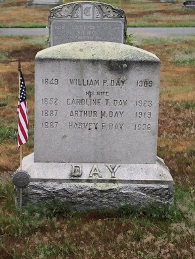Attentiveness: Cemeteries
Dr. Scott W. Sunquist
President & Professor of Missiology
 Every day I leave my home I pass a cemetery.
Every day I leave my home I pass a cemetery.
This past Wednesday, more than other days, I paused to read some tombstones and reflect on life and death. The ancient Christians had it right. They said it is healthy every day to reflect on your death, if you would live a Christian life. In our contemporary self-absorbed world, such a saying seems ridiculous.
However, it is very healthy to be aware of your mortality and to live accordingly.
Jesus said, “I am the resurrection and the life,” not “I am immortal life.” There is a difference. Our life in this world is temporary in duration, but eternal in significance.
As I looked at the tombstones this week I thought, “What was the significance of Arthur’s life? I don’t think I have heard of him before. Did he do something significant? He was only 32 years. I am over twice that age. Caroline, probably Arthur’s mother, lived so much longer and even witnessed the death of her son.
Life is so difficult. Watching your children die should just not happen. As my father said after my sister died, “It is just not right, son; a father should not watch his daughter die.”
Psalm 90 comes to mind whenever we pass a cemetery:
Our days may come to seventy years,
or eighty, if our strength endures;
yet the best of them are but trouble and sorrow,
for they quickly pass and we fly away…
Teach us to number our days,
that we may gain a heart of wisdom….
Establish the work of our hands for us;
yes, establish the work of our hands.
Passing the cemetery every day, and for the past four months, looking at daily reports on death tolls from COVID-19 have led me to reflect on numbering my days.
We are led to a prayer of Moses, Psalm 90. “Teach us to number our days.” In other words, teach us to do what is important, not just what is possible. Teach us to live (or possibly die) for others, not for ourselves. Teach us to be attentive to You, not our own desires. Teach us to think this way every day, today; for we do not know if we have tomorrow.
Then, for a brief moment, as I left the cemetery, I thought what this means for a seminary president. I want to make sure that we number our days. I want to make sure that our graduates, when their names are written on tombstones, that something of eternal significance has been transacted in their lives.
So, my prayer is that our Gordon-Conwell students learn to live their lives for eternal significance, not temporary gains or joys. This means they develop the joy of leading people to faith in Christ and of being advocates for the poor and oppressed. Both make an eternal difference and both, when woven together reflect the character of Jesus, who is our life. A life lived for others, that has ushered others into the Kingdom, has value, eternal value.
We can summarize this supreme purpose in life with the beautiful word “righteousness.” Our righteousness comes through Christ and we live lives of righteousness when we live according to God’s Holy character.
So, a century from now someone may see my name on a tombstone. One name, two dates as a marker that a life was lived. But what was that life that was lived? “Lord, teach us to number our days!”
SWS
 Scott W. Sunquist, the new President of Gordon-Conwell Theological Seminary, writes a weekly blog, “Attentiveness” which is posted each Monday morning on the Gordon-Conwell web site. He welcomes comments, responses and good ideas.
Scott W. Sunquist, the new President of Gordon-Conwell Theological Seminary, writes a weekly blog, “Attentiveness” which is posted each Monday morning on the Gordon-Conwell web site. He welcomes comments, responses and good ideas.
